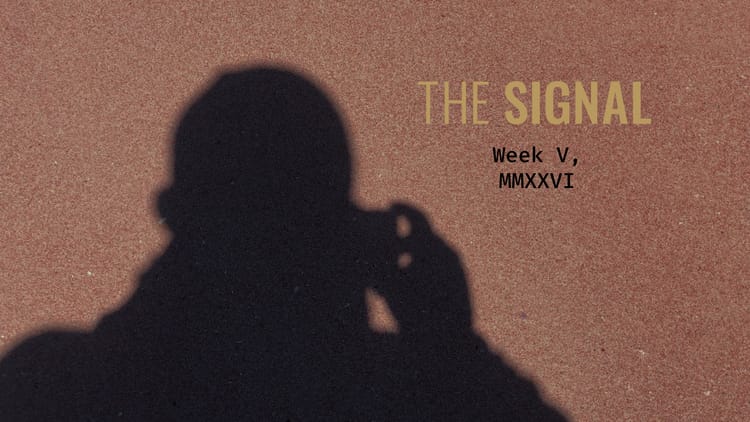Promises, promises

Plus: More developments. … Books from Kathryn C. Lavelle, on why the U.S. is so interested in the Arctic; Helle Bank Jorgensen, on whether sustainability really still matters for corporations; and Patrick McGee, on why Apple is stuck in China. … Music from Max Richter, Facta, and Bob James. … & Does anyone still listen to smooth jazz?
And: Martin Wolf on why the U.S. economy is showing such strange resiliency. … Seth Harp on why the spread of major crime within the U.S. Special Forces. … & Tim Naimi on why so many people in so many countries around the world are drinking less. … + The weather report: 58.4880° N, 19.8633° E …
When the Gray brothers—Joseph William and, remarkably, Admiral Nelson—bought The Cleveland Advertiser and decided to rebrand it in 1842, they said, “our democracy and modesty suggest the only name that befits the occasion” would be one that emphasized their fundamental commitment to engaging honestly and directly with their readers. The choice apparently inspired Winston Churchill to say a century later that “by all odds, The Plain Dealer has the best newspaper name of any in the world.”
In our time, new challengers to the American media establishment have often returned to The Plain Dealer’s theme, if then to come up with starker variations: Fox News alternated in its early years between the signature slogans “Fair and balanced” and “We report, you decide.” One America News launched more than a decade ago with an assurance of “just the facts, empowering you to form your own beliefs.” You’ll recognize the idea as it’s hardened: They twist things; we give ‘em to you straight.
There’s a new wave for it now, from newer challengers.
And with good reason. Mainstream news organizations across America, like so many of their counterparts around the world, have become more and more enthralled with essentially the opposite idea—that the purpose of journalism is narrative. Facts just serve it. “The power of storytelling”—how often have you heard that? Some people out here evidently embrace it; many of us, increasingly, find it patronizing. Or worse, disinformation. Or possibly worse still, useless.
The problem for those of us looking for what the new challengers are talking about is that, invariably, they end up doing the same thing—creating narratives, writing stories, telling us what to think—just with the added flattery that consuming their authority over mainstream news organizations’ makes us free thinkers.
We’re all looking for plain dealing. At The Signal, we reckon it means something specific: avoiding hype, identifying real questions, and following them where they go, even when—especially when—that leads somewhere unexpected.
Welcome back,
—John Jamesen Gould
The Signal—your loyal guide to a changing world.
The member’s despatch—your weekly briefing on global events, new books, new music, &c.
More than the news, every week, for less than a premium coffee every month.

Developments
The world in brief, July 19-25
The Epstein gamble
On Wednesday, The Wall Street Journal reported that U.S. Attorney General Pam Bondi briefed President Donald Trump in May that his name appears in files the Department of Justice possesses related to the disgraced financier, convicted sex offender, and now late Jeffrey Epstein. This was weeks before the DoJ decided against releasing the files, despite Trump’s campaign promises of transparency, specifically about the Epstein case.





